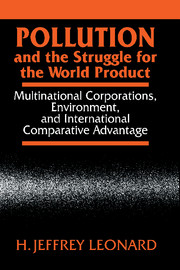 Pollution and the Struggle for the World Product
Pollution and the Struggle for the World Product Book contents
- Frontmatter
- Contents
- List of tables
- Preface
- Introduction
- 1 The dynamics of international trade and industrial location
- 2 Industrial-development strategy and the role of multinational corporations
- 3 Pollution and comparative advantage in industrial production
- 4 Environmental regulations and the industrial-flight hypothesis
- 5 Pollution and industrial strategy in four rapidly industrializing countries
- 6 Bargaining for the right to pollute
- 7 The politics of pollution and multinational corporations in rapidly industrializing countries
- 8 Theoretical implications and policy recommendations
- Index
7 - The politics of pollution and multinational corporations in rapidly industrializing countries
Published online by Cambridge University Press: 05 January 2012
- Frontmatter
- Contents
- List of tables
- Preface
- Introduction
- 1 The dynamics of international trade and industrial location
- 2 Industrial-development strategy and the role of multinational corporations
- 3 Pollution and comparative advantage in industrial production
- 4 Environmental regulations and the industrial-flight hypothesis
- 5 Pollution and industrial strategy in four rapidly industrializing countries
- 6 Bargaining for the right to pollute
- 7 The politics of pollution and multinational corporations in rapidly industrializing countries
- 8 Theoretical implications and policy recommendations
- Index
Summary
Industrial-development officials in Ireland, Spain, Mexico, and other rapidly industrializing countries have become more active in bargaining over pollution with incoming multinational firms. When it suits their needs, they also make more vigorous attempts to renegotiate old rules after the plant has come on stream. While the bargaining process remains uncertain, subject to widely varying pollution restrictions from locality to locality and factory to factory, national and local governments have increasingly asserted themselves and built up their expertise in the arena of pollution-control negotiations.
One reason why governments in many industrializing countries have begun to bargain more assertively with foreign investors is that local citizens have become much more concerned about industrial pollution since the early 1970s. Such increased public activism has made it risky for governments, especially local governments, to be lax about pollution control. A public that perceives that it is considered expendable by a foreign company can conclude that its own representatives agree, especially if the officials have obviously turned a blind eye to the environmental problems associated with the company's operations. Some national and local governments therefore feel that they have a political mandate to be more stringent and to scrutinize more closely at the outset.
However, the mere fact that officials of host countries strike a tough bargaining posture does not necessarily mean that industrial-pollution problems caused by foreign investors are avoided or substantially reduced.
- Type
- Chapter
- Information
- Pollution and the Struggle for the World ProductMultinational Corporations, Environment, and International Comparative Advantage, pp. 191 - 230Publisher: Cambridge University PressPrint publication year: 1988


